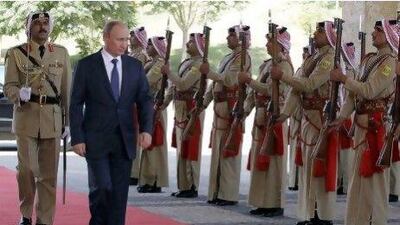JERUSALEM //Russia's president yesterday criticised Israel's settlements as problematic for Middle East peace during a visit with Mahmoud Abbas, the Fatah and Palestinian Authority's leader.
Vladimir Putin was on the second of a two-day tour of the region, which analysts billed as an attempt to allay concerns over Moscow's support for Iran and Syria and broaden its ties with Israel. The Palestinians did not figure prominently on day one of Mr Putin's trip.
After yesterday's meeting in the West Bank city of Bethlehem, Mr Putin lent support to Mr Abbas, calling his position on the peace process "responsible".
He also criticised Israel and its expansion of Jewish settlements onto Palestinian territories, referring to this as "unilateral action" that is "not constructive". The last round of peace talks between Israel and the Palestinians broke down in 2010 because Israel refused to stop building settlements, a key Palestinian demand.
"I point out here the responsible position of President Abbas and his endeavour to reach a peaceful settlement based on a two-state settlement," Mr Putin said.
Russia is a member of the Middle East peace quartet, which also consists of the United States, European Union and the United Nations.
Few predict substantial changes to Russian policy despite frustration in the region over Russia's support for the Syrian president, Bashar Al Assad, during a government crackdown that has killed as many as 14,000 Syrians, many of them civilians, over the last 16 months.
Mr Abbas yesterday named a road in Bethlehem after Mr Putin, who also toured the Nativity Church where Jesus is said to have been born.
Later yesterday, Mr Putin travelled to Jordan for talks with King Abdullah II. Officials said they talked about the bloodshed in Syria, stalled Mideast peace efforts, Iran's nuclear programme, Russian assistance to Jordan to build a nuclear reactor for peaceful purposes and modernising an oil terminal in the Gulf of Aqaba.
In the meeting, King Abdullah called for a "political solution to the crisis in Syria that would protect the unity and stability of the country and end the violence and bloodshed", a Royal Palace statement said. He said that a solution must have an "Arab and international consensus". Mr Putin and the king met in a conference hall on the shores of the Dead Sea.
Later, Putin inaugurated a Russian guesthouse in the baptismal site in the nearby Jordan River, where tradition says Jesus was baptized by John the Baptist. If anything, analysts said, the regional foray was an attempt to reassert Russia's declining influence in the region. It was also intended to bolster ties with Israel, said Yaron Ezrahi, a professor of political science at the Hebrew University of Jerusalem, who called the visit a calculated display of Russian influence to Washington.
"Putin is trying to renew the struggle with the United States in terms of the old Cold War areas competition for influence in the region," he said. "Because of this, he couldn't skip over Israel because it's a very powerful state that is here."
He and other analysts say there room to build on Russian-Israeli ties, although few believe the two countries can bridge their divide over Syria or Tehran's nuclear programme.
That seemed to be the case after Monday's meetings with Israeli leaders.
Benjamin Netanyahu, the Israeli prime minister, told reporters that the pair agreed that "nuclear weapons in the hands of Iran represents a grave danger, first of all to Israel, but also to the region and to the entire world".
Israel's president, Shimon Peres, issued a personal plea. "I ask as a personal request that you make your voice heard against a nuclear Iran, against genocide," he said.
Mr Putin, however, showed few signs of budging on either Iran or Syria.
* With additional reporting by Bloomberg News and Associated Press
Follow
The National
on
& Hugh Naylor on

